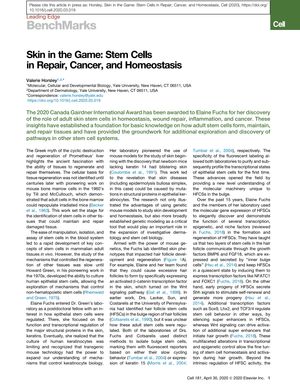Skin in the Game: Stem Cells in Repair, Cancer, and Homeostasis
March 2020
in “
Cell
”

TLDR Elaine Fuchs' research shows how skin stem cells maintain health, aid in healing, and are involved in cancer.
In 2020, Elaine Fuchs received the Canada Gairdner International Award for her pioneering research on adult skin stem cells, particularly their roles in homeostasis, wound repair, inflammation, and cancer. Her work using mouse models has been instrumental in understanding the regulation of hair follicle stem cells (HFSCs), uncovering the significance of growth factors, transcription factors, and epigenetic mechanisms in HFSC maintenance and hair growth. Fuchs' lab also revealed that HFSCs are involved in wound healing by contributing to epidermal migration for wound closure and that epidermal stem cells possess an inflammatory memory that improves their response to subsequent injuries. Furthermore, her research has shed light on the molecular mechanisms of skin cancer and the impact of the microenvironment on cancer stem cells. Her contributions have significantly advanced stem cell biology and impacted various fields, including immunology, dermatology, and cancer biology.





